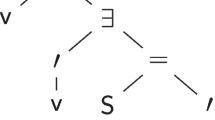Abstract
This paper deals with the question of the logicality of modal logics from a proof-theoretic perspective. It is argued that if Dos̆en’s analysis of logical constants as punctuation marks is embraced, it is possible to show that all the modalities in the cube of normal modal logics are indeed logical constants. It will be proved that the display calculus for each displayable modality admits a purely structural presentation based on double-line rules which, following Dos̆en’s analysis, allows us to claim that the corresponding modal operators are logical constants.
Similar content being viewed by others
References
Avron, A., Simple consequence relations, Inf. Comput. 92(1):105–139, 1991.
Belnap, N.D., Display logic, Journal of Philosophical Logic 11(4):375–417, 1982.
Belnap, N.D., The display problem, in H. Wansing, (ed.), Proof Theory of Modal Logic, Springer Netherlands, Dordrecht, 1996, pp. 79–92.
Binder, D., and T. Piecha, Popper’s notion of duality and his theory of negations, History and Philosophy of Logic 38(2):154–189, 2017.
Bonnay, D., and B. Simmenauer, Tonk strikes back, Australasian Journal of Logic 3:33–44, 2005.
Ciabattoni, A., and R. Ramanayake, Power and limits of structural display rules, ACM Trans. Comput. Logic 17(3):17:1–17:39, 2016.
Dalla Chiara, M. L., and R. Giuntini, Quantum logics, in D.M. Gabbay, and F. Guenthner, (eds.), Philosophical Logic, vol. VI, Springer, Netherlands, Dordrecht, 2002, pp. 129–228.
Dicher, B., Weak disharmony: Some lessons for proof-theoretic semantics, Review of Symbolic Logic 9(3):583–602, 2016.
Dos̆en, K., Sequent-systems for modal logic, Journal of Symbolic Logic 50(1):149–168, 1985.
Dos̆en, K., Logical constants as punctuation marks, Notre Dame Journal of Formal Logic 30:362–381, 1989.
Garson, J., Modal logic, in E.N. Zalta, (ed.), The Stanford Encyclopedia of Philosophy, spring 2016 edn., Metaphysics Research Lab, Stanford University, 2016.
Goré, R., Gaggles, Gentzen and Galois: How to display your favourite substructural logic, Logic Journal of the IGPL 6(5):669–694, 1998.
Gratzl, N., and E. Orlandelli, Double-line harmony in sequent calculi, in P. Arazim, and T. Lavicka, (eds.), The Logica Yearbook 2016, College Publications, 2017, pp. 157–171.
Hacking, I., What is logic?, The Journal of Philosophy 76:285–319, 1979.
Kürbis, N., Proof-theoretic semantics, a problem with negation and prospects for modalities, Journal of Philosophical Logic 44:713–727, 2015.
Kracht, M., Power and weakness of the modal display calculus, in H. Wansing, (ed.), Proof Theory of Modal Logic, Kluwer, 1996, pp. 93–121.
MacFarlane, J., Logical constants, in E.N. Zalta, (ed.), The Stanford Encyclopedia of Philosophy, fall 2015 edn., Metaphysics Research Lab, Stanford University, 2015.
Martin-Löf, P., Hauptsatz for the intuitionistic theory of iterated inductive definitions, in J.E. Fenstad, (ed.), Proceedings of the Second Scandinavian Logic Symposium, vol. 63, Elsevier, 1971, pp. 179–216.
Naibo, A., and M. Petrolo, Are uniqueness and deducibility of identicals the same?, Theoria 81:143–181, 2015.
Negri, S., Proof analysis in modal logics, Journal of Philosophical Logic 33:507–544, 2005.
Negri, S., and J. von Plato, Structural Proof Theory, Cambridge University Press, 2001.
Poggiolesi, F., Display calculi and other modal calculi: A comparison, Synthese 173(3):259–279, 2010.
Popper, K.R., Functional logic without axioms or primitive rules of inference, Koninklijke Nederlandsche Akademie van Wetenschappen, Proceedings of the Section of Sciences 50:1214–1224, 1947.
Popper, K.R., Logic without assumptions, Proceedings of the Aristotelian Society 47:251–292, 1947.
Popper, K.R., New foundations for logic, Mind 56:193–235, 1947.
Prawitz, D., Natural Deduction: A Proof-Theoretical Study, Almqvist & Wiskell, 1965.
Read, S., Harmony and modality, in C. Dégremont, (ed.), Dialogues, Logics and Other Strange Things: Essays in Honour of Shahid Rahman, College Publications, 2008, pp. 285–303.
Sambin, G., G. Battilotti, and C. Faggian, Basic logic, Journal of Symbolic Logic 65:979–1013, 2000.
Schroeder-Heister, P., Popper’s theory of deductive inference and the concept of a logical constant, History and Philosophy of Logic 5:79–110, 1984.
Schroeder-Heister, P., Proof-theoretic semantics, self-contradiction, and the format of deductive reasoning, Topoi 31(1):77–85, 2012.
Wansing, H., Sequent calculi for normal modal propositional logics, Journal of Logic and Computation 4(2):125–142, 1994.
Wansing, H., Displaying Modal Logic, Kluwer, 1998.
Wolenski, J., First-order logic: (Philosophical) pro and contra, in V.F. Hendricks, (ed.), First-Order Logic Revisited, Logos, 2004, pp. 369–398.
Acknowledgements
Thanks are due to two anonymous referees and to the audience at the 7th Conference on Non-Classical Logic in Toruń and at the conference General Proof Theory in Tübingen.
Author information
Authors and Affiliations
Corresponding author
Rights and permissions
About this article
Cite this article
Gratzl, N., Orlandelli, E. Logicality, Double-Line Rules, and Modalities. Stud Logica 107, 85–107 (2019). https://doi.org/10.1007/s11225-017-9778-0
Published:
Issue Date:
DOI: https://doi.org/10.1007/s11225-017-9778-0



